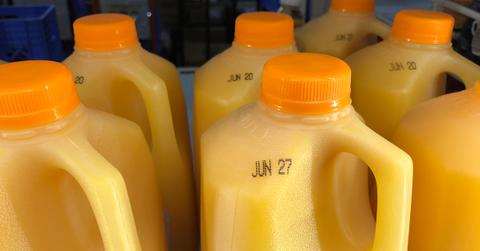Expiration Labels Could Soon Get a Makeover, Help Americans Reduce Food Waste
The Food Date Labeling Act could help solve the U.S.'s food waste problem.
Updated Aug. 1 2019, 5:48 p.m. ET

Have you ever thrown away food that looked perfectly fine, just because the package said it was expired? As it turns out, a lot of people get confused by date labels on food packaging — and a big reason why is because expiration dates are not uniformly regulated in the U.S. To combat that, legislators introduced the Food Date Labeling Act.
The bill was first proposed to both the House and the Senate by Rep. Chellie Pingree (D-Maine) and Sen. Richard Blumenthal (D-Conn.) in 2016. Previous versions of the bill were not passed. Recently, Pingree and Blumenthal partnered with Rep. Dan Newhouse (R-Wash.) on a new version of the bill to bring the issue back into the spotlight. Should the latest iteration become law, the Food Date Labeling Act would standardize expiration labels across the nation, which the legislators believe would reduce consumer confusion, therefore saving more food from going to landfills, according to the NRDC.
As explained by the NRDC, in the U.S., the only food where expiration labels are federally regulated is infant formula. Some states have statewide regulations, while other states leave things up to cities or counties. There are almost 50 different terms related to dates used on food labels across the U.S., as per the NRDC — and that understandably leads to a lot of confusion. What's the difference of "best by" and "best used by"? What about "use by" versus "sell by"? And just how bad is it to eat unopened food after its expiration date? What about opened food? ...yeah. There's a lot of confusion there.
If the Food Date Labeling Act passes, manufacturers would have to streamline their language on date labels, and clarify that "sell by" dates are just suggestions. The bill also aims to launch a nationwide campaign to educate consumers on ways to reduce food waste, create a better composting infrastructure, and work with the USDA and the government on other food waste reduction initiatives.
"Tons of perfectly good food and money is trashed every day because of confusing date labels," said Elizabeth Balkan, the NRDC's Food Waste Director, in a statement. "That adds up to a staggering amount of climate pollution, wasted water and missed opportunities to feed people in need. By standardizing food date labels nationwide and educating people about what they mean, this legislation will help reduce this unnecessary waste."
The statistics Balkan is referring to are pretty shocking. In U.S. landfills, food waste is the "single largest component of solid waste" according to the NRDC — and unfortunately, food waste does not decompose in a landfill the same way it would in a compost bin. Instead, it takes decades to break down in a landfill, all the while emitting greenhouse gases like methane.
Plus, the NRDC found that 40 percent of food is wasted in the U.S., costing the average four-person household more than $1,500 annually. Not only is working to reduce food waste a positive thing for the planet, but it can also help consumers save a significant amount of money.
To reduce food waste in your kitchen, consider meal prepping, freezing your food before it goes bad, starting a compost bin, and eating expired food that shows no signs of going rotten.